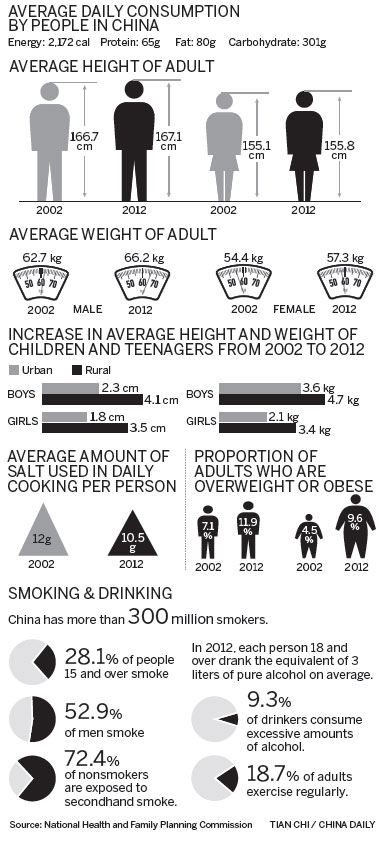
Survey: Chinese becoming taller, heavier
Source:China Daily
Shan Juan
Updated: 2015-07-01
Chinese people are eating more, thanks to their deeper pockets, making them slightly taller but also a lot fatter, according to a National Health and Family Planning Commission report released on Tuesday.
In the decade since 2002, when China first released a national report on citizens' nutrition and health, the proportion of overweight adults has increased by 32 percent and obese adults by 67 percent.
The statistics for children 6 to 17 years old are even more alarming, with the number of overweight kids doubling and obese children tripling.
At a news conference about the new report, Zhao Wenhua, deputy director of the Nutrition and Health Institution of the Chinese Center for Disease Control and Prevention, said the increase during the time was larger than that in the industrial world in general. But the rates in China are still lower than in Western countries like the US, she said.
Notably, the increase in Chinese people's height does not appear to be matching their added girth.
In 2012, the average height for men was 167.1 cm and for women 155.8 cm, a slight 10-year increase. But that makes them slightly shorter than their neighbors in Japan and South Korea, said Liang Xiaofeng, deputy director of the Chinese CDC.
That claim triggered immediate skepticism online, with many netizens denouncing the reported average heights as underestimates.
Zhao responded that the data were compiled from a sampling of nearly 200,000 Chinese, and that various key factors such as age groups and regional differences had to be considered.
She also suggested that children eat more good protein to help them grow taller.
In general, the daily calorie consumption of Chinese people has remained stable from 2002 to 2012 at 2,172, which nutritionists say is appropriate, given their physical condition and lifestyle.
But consumption of cooking oil and animal food, mostly fatty pork, has risen substantially in the past 10 years, Tuesday's report said.
Fat consumed accounted for nearly 33 percent of overall intake, far higher than the recommended 25 percent, it said.
People are encouraged to eat more good protein food like soybeans and dairy products, and they should cut down on cooking oil and salt, it said.
Chinese people have long consumed too much oil and salt due to frequent stir-frying, Zhao said.
"A good tradition of Chinese cuisine highlighting a vegetable-meat balance should be well-preserved for the sake of health," she said.
Wang Guoqiang, vice-minister of the National Health and Family Planning Commission, advised the public to become more aware of nutrition and health, saying, "Your health is mainly up to you."
Rising health challenges like hypertension and diabetes are lifestyle associated, he said.
shanjuan@chinadaily.com.cn

(China Daily 07/01/2015 page4)

World Family Summit
The World Family Organization was founded in Europe in 1947 and headquartered in Paris.
Link: / World Health Organization / United Nations Population Fund / UNICEF in China
Copyright 2014 National Health and Family Planning Commission of the PRC All rights reserved






